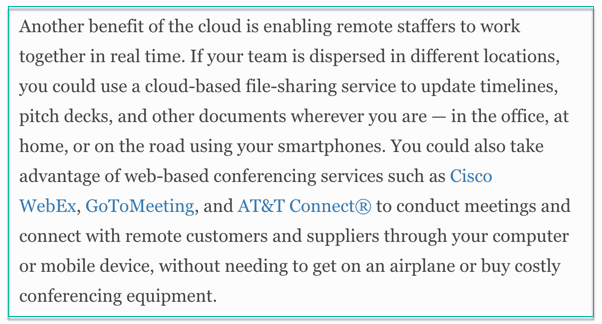What Every Business Owner Needs to Know About Cloud Computing Management
Cloud computing is the future. In fact, it’s already here! Millions of people depend on cloud computing technologies to back up their important data. Big data is the force that is driving this need, and it looks to be a technology that will be with us for a very long time.
Everyone from beginning online business owners to multi-million dollar corporations need to utilize cloud computing technology. The reason so many people rely on this technology is that you cannot afford to rely on only one storage method such as one computer or an external drive. If these drives or computers crash, you will lose all of your essential data.
For business owners, it is even more important to have this kind of backup. When you are an online site owner or manager, you are not only responsible for your data. You are also responsible for your customers’ data. This creates more liability for you and can make you suffer a loss of credibility if the data is compromised.

From Device to the Cloud
Cloud computing involves more than just managing and maintaining the data in the cloud. It also involves the data that is on your mobile devices or desktop computers and servers. Companies need to know what is coming in and going out of these devices as they are legally responsible for the security of this data as well.
For the site manager or business owner, this becomes a bigger challenge since so many people are responsible for their devices. This makes the task of monitoring what each is doing on their devices almost impossible.
This makes it necessary to put a platform and solution in place that will allow for cloud management across the various devices and platforms to avoid lack of consistency and functionality. At the same time, you must ensure that it is safe and that your networks are secure.
Too Many Devices, So Little Time
Another important challenge that online business owners face today is that employees, business partners, collaborators, and others involved in projects with your company all want to maintain the control they have over their devices. They also tend to utilize a large number of devices due to other needs or interests they have that involve their specific job titles or responsibilities.
This means you have to allow for variation in platforms, device types, and integration of a multitude of devices to keep the flow of information going and keep projects coordinated.
This puts a pretty large burden on the IT department since they are still responsible for many of the issues across multiple devices in which they are all connected to a centralized server. The IT provider must handle the individual issues on the devices as well as the data in the cloud and the software and hardware issues.
Colocation of Services
Today, with the help of “the cloud,” and other services, workers and project collaborators can log into a central server from the device of their choice and collaborate on a wide variety of projects and activities no matter where they are. This increases accessibility as well as productivity and workflow. However, you will need to update some software manually for each device to be in compliance with software licenses and to tweak individual devices to work correctly.

Tools in the Cloud
Just as much of the work we now do as business owners is “in the cloud” these days, so are the tools that we need to increase our efficiency and productivity levels. Gone are the days of needing to download or install software based on the different computers or laptops you might have. We are now in the next phase of website and data hosting and storing important data in the cloud. With all of this in mind, it’s important to be able to access such tools due to the need to keep software updated on all devices that are connected to the cloud.
If you can set up platforms that allow you to disperse critical software and security patches and updates from the cloud to all devices on the network, you will save yourself a lot of headaches in the IT and security department by avoiding having to install them manually.
When you work on things “from the cloud,” you are working remotely. This means a lot of added convenience for collaborators and managers, but it also requires more coordination and logistics management so that all systems are working properly across the board.
Smart AI Technology
One thing about cloud computing is that is it heavily immersed in AI. Companies such as nVidia.com and others have had a sudden rise in stock lately. This is because investors realize they are offering many more AI solutions to the technology world than other companies are doing. This includes cloud computing and big data management.
The smarter the technology gets in the future, the fewer business owners will have to do manually. Self-learning AI programs can correct problems as they go and even develop new solutions, rather than having to have engineers continuously check on how they are doing and ensuring that the data is safe.
With this innovation also comes more automation and less worry for the cloud computing IT manager as well as the business owner.

Storage Solutions in the Cloud
Cloud storage is one of the most important aspects of cloud computing. You can store mind-boggling amounts of data in the cloud which allows you to expand on your potential as a business owner in ways never before imagined. If you are a digital media producer, you can create endless videos, podcasts, and other digital assets and upload them to cloud storage without the worry of running out of space.
With so much storage available on most drives such as Google Drive, DropBox, and others, one wonders if someday we will all have illimitable space open. Google Drive allows you to purchase 2 TB of space for only $9.99 per month. This gives you an idea of just how cheap the cloud is when you need more space for storage.
Cloud management platforms like Cloud Management Suite understand the importance of having a cloud computing system in place. For example, Cloud Management Suite offers a wide variety of cloud services from security to data management. It’s primary features include patch tracking, remote control, software distribution, inventory discovery and history & reporting. With businesses relying on the cloud, it’s important to not only provide a cloud based solution, but also one that can scale and grow based on the needs of the end user.
The same holds true with other solutions, as it’s always important to offer excellent business phone services with a multitude of services that you can use for your business. All of this is in place, while also taking advantage of cloud computing, and catering to the end needs of the client.

Why use cloud storage?
Any online business (or offline business who needs storage solutions) should consider utilizing cloud storage today. The benefits are too numerous to mention. But basically, you’ll be covered if something happens and you lose your data or important projects on a physical drive or computer.
You don’t have to worry about system crashes or computer malfunction eating your data. If you have ever mourned the loss of files that you thought you would never retrieve, you can understand the need for cloud storage. If you lose your data on your physical drives, all you have to do is go “to the cloud” to retrieve and replace them.
As a business owner, this also increases your credibility and integrity with clients when you tell them you have cloud storage because they know that their data will never truly be lost.
Some companies that set up an “emergency plan” for loss due to fire, floods, or other natural disasters even include a cloud-based storage system as one of the factors in securing their business and often report this to insurance companies to get their rates down.
This shows the importance of using cloud storage to keep your data safe.
Grow Your Business with Cloud Computing
Additionally, you need cloud storage to grow and maintain your business. You never know how large your online company may grow over the years. Having cloud computer storage allows you to grow and expand to whatever level you can handle as you increase your storage space and online collaboration capabilities “in the cloud.”
 When you depend on cloud storage as well as your offline tools, you have more security in what you do, and you can feel free to focus on your goals within your business and less worrying time about your security issues and loss of data. To learn more about each of these concepts and how cloud computing can improve your business, download this free ebook on the top ten security tips for IT managers.
When you depend on cloud storage as well as your offline tools, you have more security in what you do, and you can feel free to focus on your goals within your business and less worrying time about your security issues and loss of data. To learn more about each of these concepts and how cloud computing can improve your business, download this free ebook on the top ten security tips for IT managers.
Using cloud computing solutions also allows you to cut down on the amount of money you have to dedicate to your business infrastructure and on-site or in-house maintenance. Upgrades are often done automatically, and you can “set it and forget it.”
Cloud storage and computing options also allow you to put your business on automation in many ways while using the remote tools and accessibility that is necessary to expand without the worry of logistics.
Summary
Cloud computing is still a relatively new innovation that allows you to work from anywhere, have full access to your data, and keep your clients’ important data secure. Managing your cloud computing network is not difficult, but it helps to have tools that help you organize everything.
No matter what type of business or brand you are running, there are always going to be ways to make improvements and have better control over your customer data and day to day operation. Cloud computing can help you get there.






